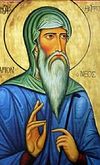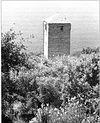

| Previous day | Next day |
| Old Style
February 14
|
Tuesday |
New Style
February 27
|
| Fast-free Week. Tone 5. | No fast.
|
![]() St. Auxentius, monk, of Bithynia (ca. 470).
St. Auxentius, monk, of Bithynia (ca. 470). ![]() St. Cyril, Equal-to-the-Apostles, teacher of the Slavs (869).
St. Cyril, Equal-to-the-Apostles, teacher of the Slavs (869).
St. Maron, hermit of Cyrrhus (ca. 433). St. Abraham, bishop of Charres in Mesopotamia (5th c.). St. Isaac, recluse of the Kiev Caves (ca. 1090). Translation of the relics of Martyrs Prince Michael and his counselor Theodore, of Chernigov (1578). St. Hilarion the Georgian (the New) of Imereti and Mt. Athos (1864).
New Hieromartyr Onesimus (Pylaev), bishop of Tula (1937).
St. Peter, patriarch of Alexandria (380). Hieromartyr Philemon, bishop of Gaza. New Martyr Nicholas of Corinth (1554). New Monk-martyr Damian of Philotheou and Kissavos, at Larissa (1568). New Martyr George the Tailor, of Mytilene, at Constantinople (1693). St. Raphael, bishop of Brooklyn (1915). St. Ephraim of Katounakia (1998).
Repose of Archimandrite Barsanuphius of Valaam and Morocco (1952), Righteous Barbara (Arkhangelskaya) the Recluse, of Ufa (1966).
Thoughts for Each Day of the Year
According to the Daily Church Readings from the Word of God
By St. Theophan the Recluse

Tuesday. [II Pet. 2:9–22; Mark 13:14–23]
If any man shall say to you, Lo, here is Christ; or, lo, he is there; believe him not (Mark 13:21). Christ the Lord, our Saviour, having established upon the earth the holy Church, is well pleased to abide in it, as its head, enlivener, and ruler. Christ is here, in our Orthodox Church, and He is not in any other church. Do not search for Him elsewhere, for you will not find Him. Therefore, if someone from a non-orthodox assemblage comes to you and begins to suggest that they have Christ—do not believe it. If some one says to you, “We have an apostolic community, and we have Christ,” do not believe them. The Church founded by the Apostles abides on the earth—it is the Orthodox Church, And Christ is in it. The community established only yesterday cannot be apostolic, and Christ is not in it. If you hear someone saying, “Christ is speaking in me,” while he shuns the [Orthodox] Church, does not want to know its pastors and is not sanctified by the Sacraments, do not believe him. In him is not Christ, but rather another spirit appropriating the name of Christ in order to divert people from Christ the Lord and from His holy Church. Neither believe anyone who suggests to you even some small thing alien to the [Orthodox] Church. Recognize all such people to be instruments of seducing spirits and preachers of lies.
Articles
 Sts. Cyril and Methodius |
 Venerable Isaac the Recluse of the Kiev Near CavesSaint Isaac was the first person in northern lands to live as a fool for Christ. |
 St. Isaac of ToropetsAlexey GunkinFoolishness for Christ is a particular form of sanctity where spiritual gifts and virtues are consciously hidden behind external, ostensible madness. |
 St. Raphael Bishop of BrooklynFrom his youth, Saint Raphael’s greatest joy was to serve the Church. |









